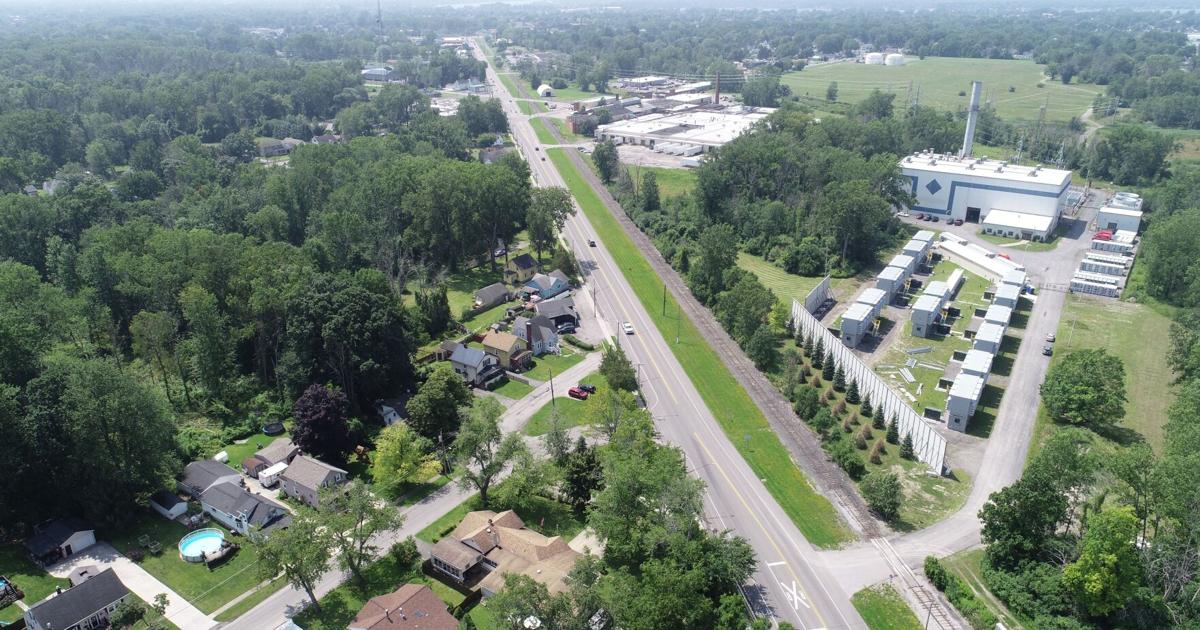In August 2021, a Los Angeles man named Alec Amar pitched state regulators a seductive vision for the future of North Tonawanda:
What if the city could anchor a booming new industry, flush with global investment and high-paying jobs?
Neighbors of the Digihost cryptocurrency mining operation in North Tonawanda say the facility has become a nuisance and an environmental hazard.
That nascent industry – cryptocurrency mining – had already made small, quiet forays into Western New York, thanks to the region’s cheap electricity and real estate costs. But Amar, then in his mid-20s, hoped to expand his existing operation by acquiring the old Fortistar power generating plant and using it to fuel a fleet of the specialized computers needed to “mine” Bitcoin and other virtual tokens.
If the state approved the sale, Amar wrote in a letter to the Public Service Commission, his company would retrofit the gas-burning plant with groundbreaking, state-of-the-art technologies that would allow it to run without producing greenhouse gas emissions. The project would also, he said, bring stable tech jobs and “billion-dollar international companies” to the region.
People are also reading…
State regulators have since granted Amar’s company – Digihost International Inc. – permission to buy the power plant.
But two years later, Amar’s other visions have not yet come to pass.

North Tonawanda resident Deb Gondek holds a petition supporting an injunction to stop Digihost’s Bitcoin mining project on Erie Avenue in the city.
Instead, some North Tonawanda residents say, the Digihost cryptocurrency facility on Erie Avenue has become a persistent nuisance and environmental hazard – overseen by a mysterious, out-of-town firm that has hired few local workers and shared little about its plans for the future.
“We don’t want this to turn into a Love Canal situation,” said Karen Hance, who lives 600 feet from Fortistar.
In July, more than two dozen residents and 60 environmental groups appealed to Gov. Kathy Hochul, asking her to accelerate a pending review of the facility’s air pollution permit. The “resurrection” of fossil-fuel plants to mine cryptocurrency has dramatically increased greenhouse emissions, water pollution and noise pollution, they said.
Neither Amar nor his father, Michel, responded to several interview requests, and denied – through another Digihost executive, Luke Marchiori – a reporter’s request to visit, citing ongoing construction.
The case forms part of a growing national backlash against cryptocurrency mining, still seen by some as a boon to small, post-industrial communities. At least five crypto facilities have located in Erie and Niagara counties.
Technologists have championed such projects, and cryptocurrencies like Bitcoin, as revolutionary “disruptors” that could support the development of new renewable energy sources and forever change the financial system. But volatility and fraud in the cryptocurrency market – as well as persistent concerns about the industry’s energy needs – have fueled calls for greater oversight, particularly of miners that seek to revive or retrofit fossil fuel power plants.
In November, New York became the first state to temporarily ban these types of operations, pending an environmental review. Regulators greenlit Digihost’s North Tonawanda cryptomine before the ban, however.
Environmentalists argue that timing should not save the project.
“Purchasing an entire gas plant to run all the time, 24/7, is fundamentally inconsistent” with state climate law, said Mandy DeRoche, a deputy managing attorney with the national environmental advocacy group Earthjustice, which has sued to block Digihost.
Deb Gondek shares her concerns about the Digihost cryptocurrency mining facility in North Tonawanda.
An ideal target
Like other Bitcoin mining operations, Digihost came to Buffalo in pursuit of cheap power. Amassing new coins requires lots of it. The virtual currency is created, or “mined,” by solving complex computational puzzles with banks of specialized computers. In addition to the electricity needed to power the computers themselves, mining facilities also require energy for industrial cooling systems and network equipment – making electricity the largest operating cost for many mining firms, and a prime target for crypto-entrepreneurs looking to grow their margins.
Alec Amar and Brian Yang were two such entrepreneurs, according to a lawsuit that Yang later filed against his former business partner. In 2017, the two men incorporated a new Bitcoin mining firm in California and chose to locate their first cryptomine in Buffalo.
Yang, then an engineer at Google, created the software that ran the mining computers. Amar and his father Michel, a French-American fashion executive, provided $36,000 of upfront investment.
The young company then developed a 60,000-square-foot data center in the former American Axle plant on East Delavan Avenue before transferring it in 2020 to Digihost, where Alec serves as president and Michel as chief executive. Yang alleges that the two men mishandled corporate funds and shut him out of the business, which the Amars dispute; the case is ongoing in Los Angeles Superior Court.
As the price of Bitcoin climbed past $60,000 in 2021, and as Digihost amassed more than 11,000 computers, the Amars began looking for other sources of electricity. They found it in Fortistar, an old natural-gas-burning plant that the company said could power as many as 1.3 quintillion – or 1.3 billion billion – attempts to solve a Bitcoin puzzle every second.

An out-of-town Bitcoin mining company called Digihost promised to bring well-paid tech jobs and green technologies to the former Fortistar plant in North Tonawanda.
“We are extremely excited to have achieved this milestone in the evolution of our Company,” Alec Amar said in a March 2021 news release, which estimated that the plant would give Digihost the capacity to mine roughly $11.8 million of Bitcoin per month, at current valuations.
The project represented a major shift for the 30-year-old Fortistar facility, a so-called “peaker plant” that had previously kicked in only to supply the grid only at times of urgent demand. Digihost planned to continue those operations while also installing Bitcoin miners that ran 24 hours per day in as many as 40 small structures on the grounds, powering them with electricity from the Fortistar plant.
At a North Tonawanda City Council meeting in August 2021, Michel Amar pitched the venture as an economic boon that would create at least 20 to 30 high-paid Digihost jobs in Western New York and make the region a center of financial technology and green energy innovation. Digihost prided itself on being “very green and socially responsible,” he said.
“We are trying to do the right thing for the community … we are here to work with you,” he said.
One slide in his presentation addressed a specific concern that had dogged other crypto enterprises: “NO NOISE WILL BE HEARD ANYWHERE OUTSIDE THE PREMISES,” it read.

Digihost has installed a sound barrier, trees and shrubs in response to resident complaints about noise from the cryptomining facility.
Benefits unclear
But noise is heard outside the premises, neighbors say: a dull, pitchless, intermittent roar like Thruway traffic or Niagara Falls. Even after Digihost installed a 26-foot sound barrier and $100,000 in trees and shrubs, the sound of the industrial fans used to cool its computers drifted into nearby residential areas.
In May and June, Jack Kanack – a meteorologist and trained noise-meter reader – set out to quantify the low rumbles around the plant. On several occasions, according to records he shared with The Buffalo News, he found it emitting high levels of low-frequency noises that spiked higher when the wind blew in his direction.

Karen Hance lives 600 feet from the Fortistar plant in North Tonawanda. “We don’t want this to turn into a Love Canal situation,” she said.
“This used to be like living in a park,” Hance said of her wide, well-gardened backyard, which has emptied of the possums, raccoons and other wildlife it once attracted.
“Seriously, it has come to the point where my family is considering moving out of the City. We can no longer relax in the quiet of our own home,” wrote Kevin O’Connor, a homeowner half a mile to the northwest, in a May email to North Tonawanda lawmakers.
Critics say Digihost has not delivered on its economic promises, either. As of December 2022, the company directly employed 11 full-time staff in the U.S., according to corporate records filed with the Securities and Exchange Commission. While that figure does not include employees hired through subcontractors or subsidiaries, North Tonawanda Mayor Austin Tylec also said he did not believe the cryptomine had generated new local jobs besides a few security positions.
Niagara County reassessed the value of the Fortistar plant this year to just over $77,000 to account for the new mining venture, from roughly $49,000 last year, according to the county property tax office. Digihost has not received assistance from the Niagara County Industrial Development Agency, though the company has told investors it receives a discounted rate on electricity from the state.
Tylec, who as a City Council member lobbied for a temporary moratorium on cryptomining facilities, faulted his predecessors for failing to better scrutinize Digihost and its impact on the surrounding community. Local staff members at the Fortistar plant have worked closely with the city to address noise complaints and “be a good neighbor,” the mayor said.
“It was not Digihost’s responsibility when they first came here to make sure North Tonawanda had the right zoning codes in place,” Tylec said. “It was up to city officials to make sure that was done before approval … and they unfortunately didn’t do that.”
Costs to the community will soon grow steeper, neighbors and environmentalists predict.
The Fortistar plant still primarily operates to supplement the grid – a practice that yielded between 11,000 and 18,000 metric tons of carbon dioxide each year between 2017 and 2019, according to data filed with state regulators.
Those emissions could spike dramatically, however, if Digihost runs the plant more frequently to power its on-site miners. In an environmental audit submitted to the state last September, plant operators wrote that they now “anticipate” generating more than 300,000 metric tons of carbon dioxide each year – equivalent to the emissions from more than 66,000 motor vehicles.
“It’s a huge increase in greenhouse gas emissions at a time when you can see all the impacts that climate change is having,” said Deb Gondek, the former director of sustainability for Rich Products and a North Tonawanda resident who opposes the Digihost project. “Why are we allowing all these additional emissions for an industry that benefits just a few people? We have to rethink that.”

Neighbors of the Digihost cryptocurrency mining operation in North Tonawanda say the facility has become a nuisance and environmental hazard.
An ‘evolving’ space
A 2022 peer-reviewed study published in the journal Scientific Reports calculated that Bitcoin miners cause 35 cents worth of climate damage for every $1 of Bitcoin they unlock.
But Digihost sees itself as part of the climate solution, not the problem, said Marchiori, the company’s chief renewable energy officer. Marchiori – who lives in Western New York and serves an “advisory” role at Digihost – met the Amars when his energy marketing company began supplying power to their East Side project.
Since then, he said, that cryptomine has become the anchor subscriber for a community solar farm in the Genesee County Town of LeRoy, and signed on to a number of statewide programs that reward major power-consumers for cutting their use during peak-demand periods.
Cryptomining operations, with their steady, consistent need for power, can also help drive demand for green energy projects and technologies, he said. In the coming months, Marchiori said Digihost will transition the Fortistar facility to run on a mix of conventional and “renewable” natural gas, an equivalent fuel derived from the decomposition of organic matter, like food waste and animal manure.
Marchiori also said Digihost looks to blend hydrogen with natural gas to reduce carbon emissions, echoing a proposal Alec Amar made to the Public Service Commission in 2021.
“The plant … will undergo upgrades at the end of 2023 to install and use hydrogen power,” he wrote.
Critics raise significant questions about the feasibility and benefits of both technologies, which some researchers and environmental advocates have panned as “greenwashing.” Renewable and conventional natural gas leak similar amounts of methane, for instance – a potent greenhouse gas that contributes to climate change.
The Environmental Protection Agency also has no record of a renewable natural gas producer in Pavilion, where Marchiori said Digihost planned to source much of its fuel. He declined to provide further details about the producer.
Meanwhile, New York has no pipeline infrastructure to transport hydrogen – and most hydrogen in use today is extracted from natural gas.
In their September 2022 environmental audit, Fortistar’s operators wrote that “there are numerous technological hurdles that need to be overcome before [hydrogen] can function as a viable alternative fuel for utility power generation.” Marchiori acknowledged that hydrogen power “is definitely an emerging technology.”
“I think you could have a windfall of new investment and development of renewables because you have this baseline” energy demand, he told The News. “It’s an interesting space – it’s evolving, it’s maturing.”
The same might be said for Digihost itself, which has operated for only three years in its current form. The company continues to signal interest in making green infrastructure investments in North Tonawanda, Tylec said, and has been in contact with the Mayor’s Office about potentially installing electric vehicle chargers in the city – though “nothing is set in stone.”
Some residents say they are no longer taking Digihost at its word. While local and state utility regulators have already approved the North Tonawanda project, Digihost must now renew a mandatory air pollution permit for the Fortistar plant with the state Department of Environmental Conservation. Gondek, Hance and O’Connor were among the more than 80 residents and environmental groups who recently asked Gov. Kathy Hochul to speed up that review.
A denial would, pending a likely appeal, shut down the Fortistar plant. In June, the state agency requested more information about how the facility plans to minimize emissions and other community impacts.
Earthjustice is also appealing a lawsuit it filed against the Public Service Commission on behalf of two local environmental groups in January, arguing that the agency should have weighed New York’s sweeping 2019 climate law when it approved the transfer of Fortistar. A judge dismissed the case in March.
Even if New York continues its crackdown on cryptomining, history suggests the industry will regroup somewhere with more lenient regulations. Cryptomining exploded in the U.S. after China cracked down in 2021, citing – among other concerns – a desire to help the country meet its carbon reduction targets.
Digihost has also acquired new facilities in Alabama and North Carolina during the past 18 months, announcing in July 2022 that it does not plan further expansion in New York.
“It’s a game of whack-a-mole right now,” said Bridge Rauch, the environmental justice organizer with the Clean Air Coalition of Western New York.



![Page 16 of 2022.9.15 FNT Response to DEC's NOIA[18]](https://s3.documentcloud.org/documents/23907642/pages/2022915-fnt-response-to-decs-noia18-p16-xlarge.gif?ts=1691782028)

 Bitcoin
Bitcoin  Ethereum
Ethereum  Tether
Tether  XRP
XRP  USDC
USDC  TRON
TRON  Lido Staked Ether
Lido Staked Ether  Dogecoin
Dogecoin  Figure Heloc
Figure Heloc  Cardano
Cardano  Bitcoin Cash
Bitcoin Cash  Wrapped stETH
Wrapped stETH  WhiteBIT Coin
WhiteBIT Coin  Wrapped Bitcoin
Wrapped Bitcoin  Wrapped eETH
Wrapped eETH  USDS
USDS  Chainlink
Chainlink  Binance Bridged USDT (BNB Smart Chain)
Binance Bridged USDT (BNB Smart Chain)  LEO Token
LEO Token  WETH
WETH  Monero
Monero  Zcash
Zcash  Stellar
Stellar  Coinbase Wrapped BTC
Coinbase Wrapped BTC  Sui
Sui  Hyperliquid
Hyperliquid  Ethena USDe
Ethena USDe  Litecoin
Litecoin  Avalanche
Avalanche  Hedera
Hedera  Shiba Inu
Shiba Inu  Canton
Canton  sUSDS
sUSDS  World Liberty Financial
World Liberty Financial  USDT0
USDT0  Toncoin
Toncoin  Dai
Dai  Cronos
Cronos  PayPal USD
PayPal USD  Uniswap
Uniswap  Ethena Staked USDe
Ethena Staked USDe  Polkadot
Polkadot  USD1
USD1  Mantle
Mantle  Rain
Rain  MemeCore
MemeCore  Pepe
Pepe  Bittensor
Bittensor